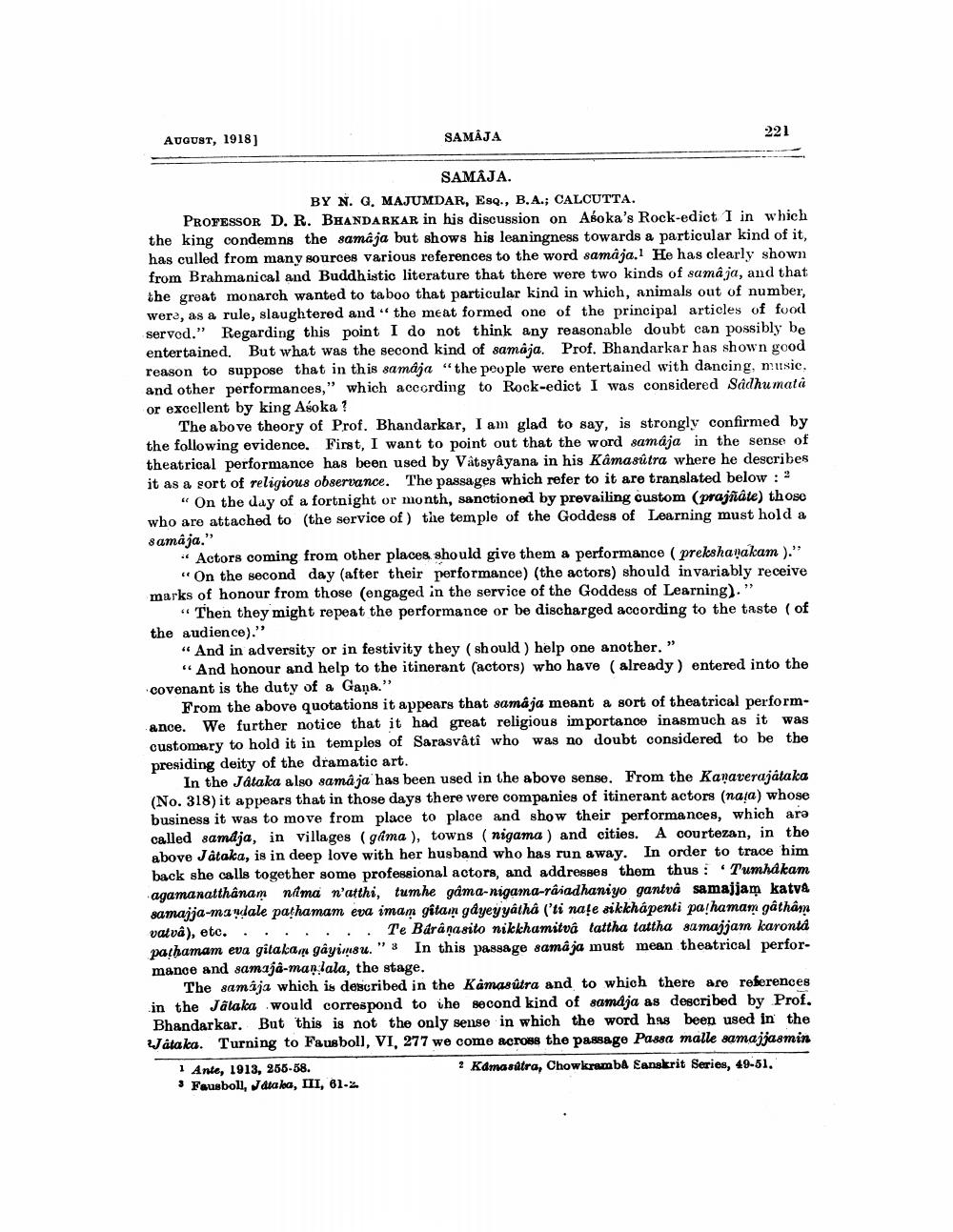________________
AUGUST, 1918]
SAMAJA
221
SAMAJA.
BY N. G. MAJUMDAR, Esq., B.A.; CALCUTTA.
PROFESSOR D. R. BHANDARKAR in his discussion on Aśoka's Rock-edict I in which the king condemns the samâja but shows his leaningness towards a particular kind of it, has culled from many sources various references to the word samaja. He has clearly shown from Brahmanical and Buddhistic literature that there were two kinds of samâja, and that the great monarch wanted to taboo that particular kind in which, animals out of number, were, as a rule, slaughtered and "the meat formed one of the principal articles of food served." Regarding this point I do not think any reasonable doubt can possibly be entertained. But what was the second kind of samaja. Prof. Bhandarkar has shown good reason to suppose that in this samaja "the people were entertained with dancing, music, and other performances," which according to Rock-edict I was considered Sâdhumata or excellent by king Aśoka?
2
The above theory of Prof. Bhandarkar, I am glad to say, is strongly confirmed by the following evidence. First, I want to point out that the word samája in the sense of theatrical performance has been used by Vâtsyâyana in his Kâmasûtra where he describes it as a sort of religious observance. The passages which refer to it are translated below: " "On the day of a fortnight or month, sanctioned by prevailing custom (prajñâte) those who are attached to (the service of) the temple of the Goddess of Learning must hold a samâja."
1 Ante, 1913, 255-58.
3 Fausboll, Jataka, III, 61-2
Actors coming from other places, should give them a performance (prekshanakam)." "On the second day (after their performance) (the actors) should invariably receive marks of honour from those (engaged in the service of the Goddess of Learning)."
"Then they might repeat the performance or be discharged according to the taste (of the audience)."
"And in adversity or in festivity they (should) help one another. "
"And honour and help to the itinerant (actors) who have (already) entered into the covenant is the duty of a Gana."
From the above quotations it appears that samâja meant a sort of theatrical performance. We further notice that it had great religious importance inasmuch as it was customary to hold it in temples of Sarasvati who was no doubt considered to be the presiding deity of the dramatic art.
In the Jataka also samâja has been used in the above sense. From the Kanaverajataka (No. 318) it appears that in those days there were companies of itinerant actors (naja) whose business it was to move from place to place and show their performances, which are called samaja, in villages (gama), towns (nigama) and cities. A courtezan, in the above Jataka, is in deep love with her husband who has run away. In order to trace him back she calls together some professional actors, and addresses them thus: Tumhakam agamanatthânam nama n'atthi, tumhe gama-nigama-râiadhaniyo gantvå samajjam katva samajja-mandale pathamam eva imam gitam gâyeyyatha ('ti nate sikkhápenti paṛhamam gâthâm valvâ), etc. Te Báráṇasito nikkhamitva tattha tattha samajjam karontá pathamam eva gitakam gâyimsu. In this passage samâja must mean theatrical performance and samaja-man lala, the stage.
"3
The samaja which is described in the Kamasutra and to which there are references in the Jataka would correspond to the second kind of samája as described by Prof. Bhandarkar. But this is not the only sense in which the word has been used in the Jataka. Turning to Fausboll, VI, 277 we come across the passage Passa malle samajjasmin 2 Kamasutra, Chowkramba Sanskrit Series, 49-51.




